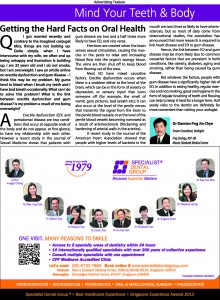 This article first appeared in the June 5th, 2014 issue of The Straits Times Mind Your Body. We have reproduced it for the information of those of you who missed it when it was published.
This article first appeared in the June 5th, 2014 issue of The Straits Times Mind Your Body. We have reproduced it for the information of those of you who missed it when it was published.
Q: I got married recently and contrary to the imagined conjugal bliss, things are not looking up. Quite simply, when I have intercourse with my wife, we often end up being unhappy and frustration is building up. I am 32 years old and I do not smoke, but I am overweight. I saw an article online on erectile dysfunction and gum disease – I think this may be my problem. My gums tend to bleed when I brush my teeth and I have bad breath occasionally. What can I do to solve this problem? What is the link between erectile dysfunction and gum disease? Is my problem a result of me being overweight?
A: Erectile dysfunction (ED) and periodontal disease are two conditions that occur at opposite ends of the body and do not appear, at first glance, to have any relationship with each other. However a recent study in the Journal of Sexual Medicine shows that patients with gum disease are two and a half times more likely to have ED, and vice versa.
Erections are created when the brain senses sexual stimulation, causing the muscles in the penis to relax and increasing blood flow into the organ’s spongy tissue. The veins are then shut off to keep blood from flowing out of the area.
Most ED have mixed causative factors. Erectile dysfunction occurs when there is a problem either at the level of the brain, which can be in the form of anxiety or depression, or sensory input that turns someone off (for example, the smell of vomit, gory pictures, bad breath etc); it can also occur at the level of the penile nerves that transmits the signal from the brain to the penile blood vessels; or at the level of the penile blood vessels becoming narrowed as a result of arteriosclerosis (thickening and hardening of arterial walls in the arteries).
A recent study in the Journal of the American Heart Association showed that people with higher levels of bacteria in the mouth are two times as likely to have arteriosclerosis, but as most of data come from observational studies, the association has announced that more research is required to link heart disease and ED to gum disease.
Hence, the link between ED and gum disease may be more likely due to common causative factors that are prevalent in both conditions, like obesity, diabetes, aging and smoking, rather than being caused by gum disease.
But whatever the factors, people with gum disease have a significantly higher risk of ED. In addition to eating healthy, regular exercise and not smoking, good oral hygiene in the form of regular brushing of teeth and flossing can help to keep it hard for a longer time. Half yearly visits to the dentist are definitely far more convenient than visiting your urologist.
Senior Consultant, Urologist
Png Urology, #07-08
Mount Elizabeth Medical Centre
Source: © Singapore Press Holdings Limited. Reproduced with permission






